Thursday, August 18th 2016

AMD Demos Breakthrough Performance of the ZEN CPU Core
At an event last night in San Francisco, AMD provided additional architectural details and a first look at the performance of its next-generation, high-performance "Zen" processor core. AMD demonstrated the "Zen" core achieving a 40% generational improvement in instructions per clock, delivering a landmark increase in processor performance.
During the event, AMD demonstrated an 8-core, 16-thread "Summit Ridge" desktop processor (featuring AMD's "Zen" core) outperforming a similarly configured 8-core, 16-thread Intel "Broadwell-E" processor when running the multi-threaded Blender rendering software with both CPUs set to the same clock speed. AMD also conducted the first public demonstration of its upcoming 32-core, 64-thread "Zen"-based server processor, codenamed "Naples," in a dual processor server running the Windows Server operating system."The performance and efficiency of our 'Zen' core showcases AMD at its best," said Dr. Lisa Su, president and CEO of AMD. "Over the last four years we have made significant investments to develop a high-performance, multi-generation CPU roadmap that will power leadership products. Customer excitement for 'Zen' continues to grow as we make significant progress towards the launch of new products that will span from the datacenter to high-end PCs."
The "Zen" processor core features multiple architectural advances designed to increase the performance, throughput, and efficiency of AMD's future products. "Zen" is based on a clean-sheet design and features a new cache hierarchy, improved branch prediction and simultaneous multithreading (SMT). These advances will allow the "Zen" core to scale to meet the needs of a broad range of applications, including fanless 2-in-1s, embedded systems, high-performance computing, and the datacenter."An engineer may get one chance in their career to work on a project of this size and scope, and maybe never one with as much potential to impact the future as much as 'Zen,'" said Mark Papermaster, senior vice president and chief technology officer at AMD. "With 'Zen' we aim to do what many never thought possible - deliver a 40 percent generational improvement in instructions per clock while maintaining power requirements in line with our previous generation technology."
"AMD invested where it counts, with an x86 core that can scale from PCs to high-performance servers," said Linley Gwennap, principal analyst, Linley Group. "Consumers today expect to get the most out of their systems to create transformative experiences. The versatile design of 'Zen' delivers highly-efficient performance that should provide increased computing capabilities across the spectrum - from devices to cloud computing."Expected to launch first, the "Zen"-based "Summit Ridge" desktops will utilize the AMD AM4 socket, a new unified socket infrastructure that is compatible with 7th Generation AMD A-Series desktop processors - previously codenamed "Bristol Ridge" - for exceptional performance and connectivity scalability required by AMD partners and customers. The first desktop systems featuring 7th Generation AMD A-Series processors and new AM4 sockets are scheduled to ship in the second half of 2016 in OEM PC designs.
With dedicated PCIe lanes for cutting-edge USB, graphics, data and other I/O, the AMD AM4 platform will not steal lanes from other devices and components. This allows users to enjoy systems with improved responsiveness and benefit from future-ready technologies that the AM4 platform provides with a powerful, scalable and reliable computing solution.
AMD AM4 platform key technology features include:
During the event, AMD demonstrated an 8-core, 16-thread "Summit Ridge" desktop processor (featuring AMD's "Zen" core) outperforming a similarly configured 8-core, 16-thread Intel "Broadwell-E" processor when running the multi-threaded Blender rendering software with both CPUs set to the same clock speed. AMD also conducted the first public demonstration of its upcoming 32-core, 64-thread "Zen"-based server processor, codenamed "Naples," in a dual processor server running the Windows Server operating system."The performance and efficiency of our 'Zen' core showcases AMD at its best," said Dr. Lisa Su, president and CEO of AMD. "Over the last four years we have made significant investments to develop a high-performance, multi-generation CPU roadmap that will power leadership products. Customer excitement for 'Zen' continues to grow as we make significant progress towards the launch of new products that will span from the datacenter to high-end PCs."
The "Zen" processor core features multiple architectural advances designed to increase the performance, throughput, and efficiency of AMD's future products. "Zen" is based on a clean-sheet design and features a new cache hierarchy, improved branch prediction and simultaneous multithreading (SMT). These advances will allow the "Zen" core to scale to meet the needs of a broad range of applications, including fanless 2-in-1s, embedded systems, high-performance computing, and the datacenter."An engineer may get one chance in their career to work on a project of this size and scope, and maybe never one with as much potential to impact the future as much as 'Zen,'" said Mark Papermaster, senior vice president and chief technology officer at AMD. "With 'Zen' we aim to do what many never thought possible - deliver a 40 percent generational improvement in instructions per clock while maintaining power requirements in line with our previous generation technology."
"AMD invested where it counts, with an x86 core that can scale from PCs to high-performance servers," said Linley Gwennap, principal analyst, Linley Group. "Consumers today expect to get the most out of their systems to create transformative experiences. The versatile design of 'Zen' delivers highly-efficient performance that should provide increased computing capabilities across the spectrum - from devices to cloud computing."Expected to launch first, the "Zen"-based "Summit Ridge" desktops will utilize the AMD AM4 socket, a new unified socket infrastructure that is compatible with 7th Generation AMD A-Series desktop processors - previously codenamed "Bristol Ridge" - for exceptional performance and connectivity scalability required by AMD partners and customers. The first desktop systems featuring 7th Generation AMD A-Series processors and new AM4 sockets are scheduled to ship in the second half of 2016 in OEM PC designs.
With dedicated PCIe lanes for cutting-edge USB, graphics, data and other I/O, the AMD AM4 platform will not steal lanes from other devices and components. This allows users to enjoy systems with improved responsiveness and benefit from future-ready technologies that the AM4 platform provides with a powerful, scalable and reliable computing solution.
AMD AM4 platform key technology features include:
- DDR4 Memory
- PCIe Gen 3
- USB 3.1 Gen2 10Gbps
- NVMe
- SATA Express
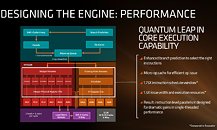
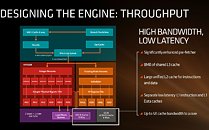
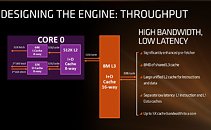
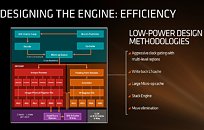
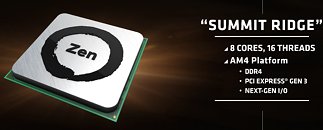
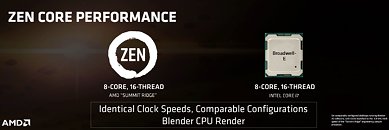
187 Comments on AMD Demos Breakthrough Performance of the ZEN CPU Core
but that should not matter, support AMD if this Zen works out.
They were intentionally sold gimped as three core CPU's, with the chance that one could be unlocked, it was a risk many purchasers took, not all were lucky.
What did Keller actually achieve at AMD? He led the team at DEC that developed the EV6 bus. AMD later purchased the EV6 IP and Keller continued his work. EV6 now named HyperTransport.
Keller was also a part of the team that developed AMD64, along with Dirk Meyer, David Cutler and Robert Short (both working at Microsoft), and SUSE - who developed the compiler,Which brings us to Intel's second gen 14nmFF process versus Glofo's 14nm. A process they have already had issues with meeting clock/power envelope targets with the RX480. Glofo's yield, ramp, and inability to supply top binned parts on previous process nodes is near legendary.I think you'll find that Intel has been spending more resources developing an improved thread scheduling engine. It might not be ready for Kaby Lake which is already shipping, but Cannonlake will surely have it.
To the argument over pricing of Athlon X2 64 and Pentium EE's, pricing was highly variable based on availability since AMD had supply issues. You can find instances where pricing changed on a monthly or weekly basis. Here's a single snapshot I quickly found from my mountain of old magazines
In general companies should show fair performance comparisons between their products and the competition's by choosing a competing product that's in a similar price / performance segment. It looks like here they've gone for Intel's very top end, know then can't really compete with it in a fair head-to-head comparison, so have put out some fudged stats to try and look better which are making people like me, @Tatty_One and others suspicious that we have another Bulldozer underperforming fiasco on our hands.
Of course, in the end, it doesn't matter what we speculate here, the official benchmarks at product launch will reveal the truth.
I could care less about RX480, and what it does on similar silicon. It's cache organization that really kills a CPU's scaling, and a GPU doesn't really reveal too much about that, IMHO. I hear what you are saying, but I am going to choose to ignore that for now. ;)
What AMD needs, is order to gain consumer acceptance, if a chip that either beats 6700K or matches 6900K. There are two ways to do that. I surmise, however, that what we'll get will be directly between the two.
I'm forward thinking to Zen and Kaby Lake and let's see the benches.
Bring on the benches and let's see what's what.
To put this in perspective Intel charge £930 for an 8C16T Broadwell i7 that Turbos to 4GHz, after the FX-9590 fiasco AMD will not dare to charge anything remotely like that, and their top CPUs may even come it at more than 4GHz.
Potentially this could be the dawning of another Athlon XP era of value for money.Indeed, it was their Netburst.
If they hadn't raised everyone's expectations so high, people wouldn't have been so pissed-off about it.
I had a few Bullys that met my lowered expectations without any problems.
This is why I suggest a ~steady as she goes~ attitude until an actual release that we can sink our teeth into. Something that is measurable.
The thing is that AMD needs to be charging more. It does little good to have the console market sewed up if they end up bankrupt from their efforts. If Zen is decent competition for Kaby Lake then I hope to see AMD being able to charge as much as Intel. The problem is that to gain market share they may have no other choice but to sell cheaper than Intel and not make a decent profit. It's a vicious cycle at this point and I don't know what they can do about it at this time.
Being serious though, there's a difference between promoting an upcoming product and misleading marketing which is what they did with Bulldozer... and Phenom II... and Phenom I... and almost all of their APU's. AMD has a history of using misleading slides and data to indicate their products will be substantially better than they actually are. Say what you will about Intel, but even if it's not the best news they stay reasonable with their claims, and are always pretty accurate.